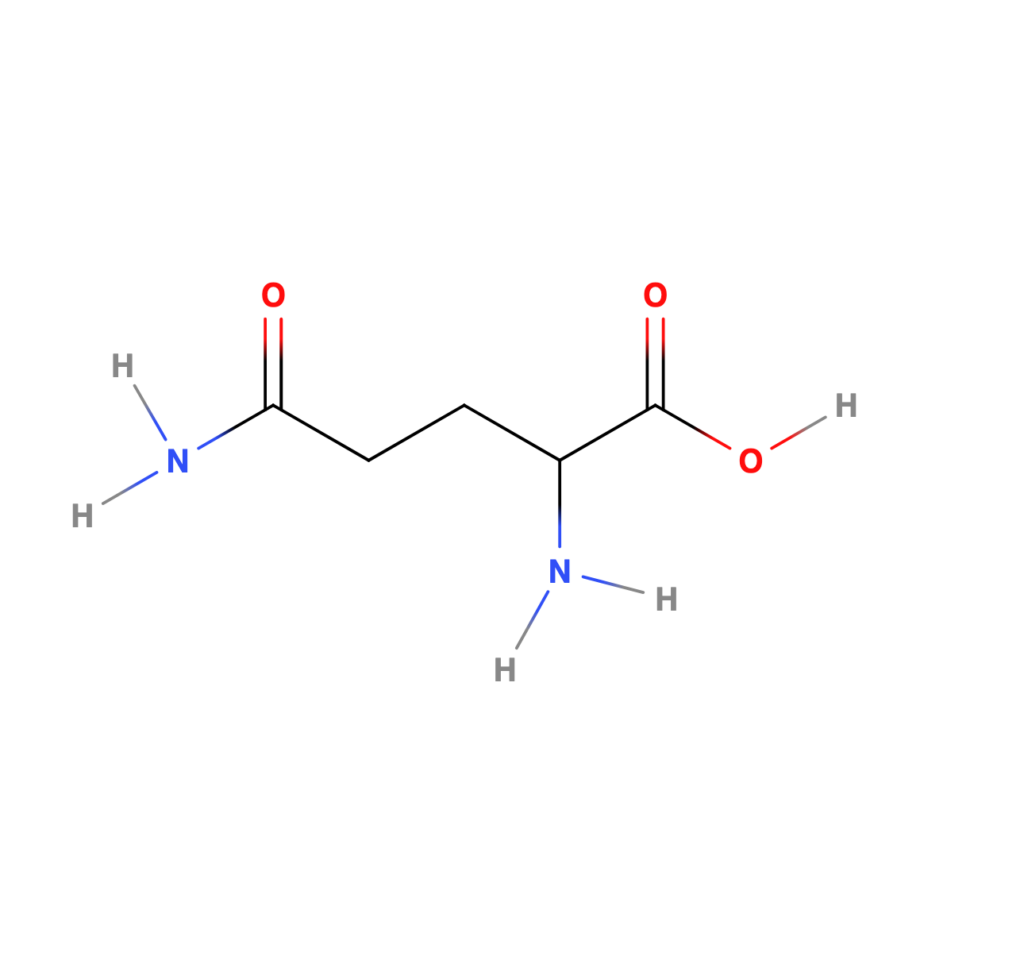Amino acids are introduced with food in the form of animal or vegetal proteins. Many amino acids can be produced by the human body starting from common precursors; others can not be synthesized de novo, so they need to be introduced with aliments. Those amino acids are called essential. Inside cells, amino acids take part in the making of proteins, they are involved in energy production and they regulate lipid mitochondrial metabolism (mitochondria are cellular organelles that produce energy).
In particular, Glutamine (L-glutamine) is a very important amino acid which can be found in all proteins of all living beings; it is the most abundant amino acid of our body, in muscles and human skeleton. The main organs using it are muscles, kidneys, liver and small intestine.

In muscles and in the skeleton glutamine is produced starting from glutamic acid in presence of ammonia (waste product of protein metabolism), ATP (adenosine triphosphate, energetic “coin” of cells) and magnesium.
For this reason, it protects organisms from ammonia intoxication, transferring it from peripheral tissues to emunctore organs to be eliminated (kidneys) or transformed (liver).
Glutamine is an important brick in protein construction, it is necessary for nitrogen transport from muscular tissues to tissues that need it and it stands out for the multiple functions it absolves and for the potential health benefits. It is necessary for cellular homeostasis (biochemical equilibrium): in fact, cells can not survive or proliferate in a glutamine-free environment.
It is an essential amino acid because generally the human body can synthesize it but in some conditions it has to be introduced with a balanced diet.
WHICH FOODS CONTAIN GLUTAMINE?
Glutamine is found naturally in a wide range of foods.
In absolute value, the highest levels of glutamine are found in animal meats, with ca 1 gr/100 gr of meat (1.2 gr in beef).
In relative value, so as percentage of protein content, glutamine is very abundant in cereals. Although, even if cereals have a high percentage of glutamine, they have a relatively low protein content, which limits the whole intake of the aminoacid.
The principal food sources of glutamine include foods of animal origin: meat, fish, eggs, milk, yogurt and cheese and of vegetal origin: beans, spinach, cabbage and beet (raw). Being a thermolabile amino acid (as most of them), heat causes the denaturation of glutamine and decreases its bioavailability.
GLUTAMINE: involvement in immune system and gut functionality
Glutamine has an important role in immune function.
White blood cells, like lymphocytes, macrophages, neutrophils need an appropriate glutamine availability to grow, proliferate and work at their best.
Despite this, in some particular cases, like inflammatory diseases, excessive immune system stimulation, stress, post-operative hospitalization, our organism needs more of it.
Glutamine plays a fundamental role in gastrointestinal system integrity maintenance, in particular colon’s one. Especially during catabolic processes, like metabolic stress, intestinal mucosa can be compromised and become more permeable to gram negative bacteria and other dangerous substances.
A “Clinical Immunology Review” study recognized how L-glutamine normalizes immune response effects, decreasing inflammatory processes at intestinal level and helping people who suffer from food intolerance.
Moreover, glutamine is the essential fuel for cellular respiration of enterocytes, colonocytes and lymphocytes; it contributes to the keeping of physiological levels of IgA (A immunoglobulins), it is capable of protecting mucosa cells from bacterial attack. It specifically supports lymphocytes proliferation and their production of protective substances (interferons); it potentiates monocytes and neutrophils phagocytosis and contributes to killer cells maintenance.
More and more people suffer from Leaky Gut Syndrome, a disorder research is dedicating high attention to and which seems to be the cause of many other autoimmune diseases like Hashimoto’s thyroiditis, arthritis and psoriasis. In a study published on “The Lancet” we can find “L-glutamine helps patients with digestive system disorders, like irritable colon (an inflammatory disorder), Crohn’s disease, ulcerative colitis, diverticulitis and diverticulosis or any other problem associated with gut permeability (such as joint pain, rosacea or any type of autoimmune response).”
Another study published in “Harvard Gazette” explains how glutamine can help the healing of stomach ulcers caused by the common and often underrated Helicobacter Pylori.
Glutamine has a decisive role also in the central nervous system, in fact, crossing the blood brain barrier, it can detoxify the brain from ammonia and act like a stimulating mediator. Some studies showed that it can be useful for memory and learning improvement and as depression or senility adjuvant.
Lastly, glutamine acts like an antioxidant: this action is fundamentally bound to the stimulation of glutathione endogenous production; glutathione is a substance capable of directly inhibiting cellular damages induced by free radicals and to delay the cell aging process.
REFERENCES:
- Trattato italiano di Nutraceutica Clinica , Arrigo F.G. Cicero , Sinut 2017
- https://www.ncbi.nlm.nih.gov/pubmed/10600341
- https://www.thelancet.com/journals/lancet/article/PII0140-6736(93)90939-E/fulltext
- https://news.harvard.edu/gazette/story/2009/05/glutamine-supplements-show-promise-in-treating-stomach-ulcers/
- Nieman DC and Pedersen BK (editors) (2000). Nutrition and Exercise Immunology. Boca Raton FL: CRC Press. Ruolo della somministrazione di glutammina sull’immunità cellulare dopo nutrizione parenterale totale arricchita con glutammina in pazienti con sindrome da risposta infiammatoria sistemica
- Crit Care,2010 dic Ferda Cetinbas 1, Birgul Yelken , Zafer Gulbas Valutazione di un nuovo database sulla composizione degli alimenti che include glutammina e altri aminoacidi derivati dai dati di sequenziamento genico
- Eur J Clin Nut2009 dicembreCM finanziatori 1, S Liu , DW Wilmore , L Sansone , LW Impasto , D Spiegelman , WC Willett
- J Nutr 2001 settembre; Perché il metabolismo della L-glutammina è importante per le cellule del sistema immunitario in condizioni di salute, post-infortunio, interventi chirurgici o infezioni? P Newsholme 1
- Ziegler T.R .. Bernfell K., Smith R.J. et al.: “Safety and metabolic effects of L-glutamine administration in humans”, J.Parenter.EnteraI.Nutr.,1990; 14:137S-146S



